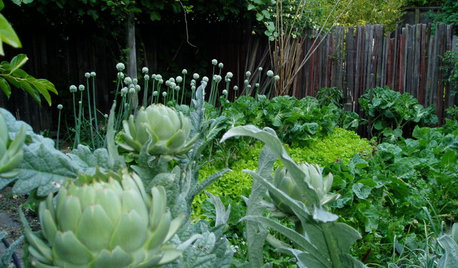How to screen my neighbor's stench?
kayan
13 years ago
Related Stories

GARDENING AND LANDSCAPINGRaise Backyard Chickens Without Ruffling Neighbors' Feathers
Before you build a coop in the backyard, follow these strategies to help keep your neighbors from squawking
Full Story
HOUZZ TOURSMy Houzz: Neighbors, a Love Story
Australian neighbors find each other a perfect match. Now the 1940s home they share is a family haven
Full Story
FRONT YARD IDEAS10 Ideas for a Front-Yard Edible Garden Your Neighbors Will Love
Choosing attractive, well-mannered plants and sharing the bounty will go a long way toward keeping the peace
Full Story
CURB APPEAL7 Ways to Create a Neighborly Front Yard
Foster community spirit by setting up your front porch, paths and yard for social interaction
Full Story
LIFE6 Tips for Teaching Your Kids to Be Good Neighbors
Everyone wins when your children learn to respect boundaries, get help when they need it and show others they care
Full Story
SIMPLE PLEASURESThe Art of Being Neighborly
Learn the heartfelt gestures that go a long way toward creating a welcoming community
Full Story
LIFEThe Polite House: How to Deal With Noisy Neighbors
Before you fly off the handle, stop and think about the situation, and follow these steps to live in harmony
Full Story
LANDSCAPE DESIGNGood Fences, Good Neighbors — and Good Views
See-through vertical fencing connects a yard with its surroundings while keeping children and pets safely inside
Full Story
GREEN BUILDINGHouzz Tour: Sea Ranch Gets a New LEED Platinum Neighbor
Oceanfront living goes sustainable in a most stunning way, in a renowned California development
Full Story
HOUZZ TOURSHouzz Tour: When MoMA is Your Next Door Neighbor
Modern Icons and Family Furniture Inspire Eclectic Manhattan Apartment Design
Full Story





deviant-deziner
shadygrove
Related Professionals
Franconia Landscape Architects & Landscape Designers · Belmont Landscape Contractors · Brandon Landscape Contractors · Burien Landscape Contractors · Farmington Landscape Contractors · Middle River Landscape Contractors · Milton Landscape Contractors · Mount Sinai Landscape Contractors · Saint John Landscape Contractors · Shaker Heights Landscape Contractors · Soddy Daisy Landscape Contractors · South Lake Tahoe Landscape Contractors · Tigard Landscape Contractors · Glasgow Decks, Patios & Outdoor Enclosures · Westford Decks, Patios & Outdoor Enclosuresmissingtheobvious
inkognito
kayanOriginal Author
mjsee
rhodium
wellspring
littledog
karinl
littledog
jollyrd
karinl
peachymomo
rhodium
littledog
shadygrove
Embothrium
missingtheobvious
littledog